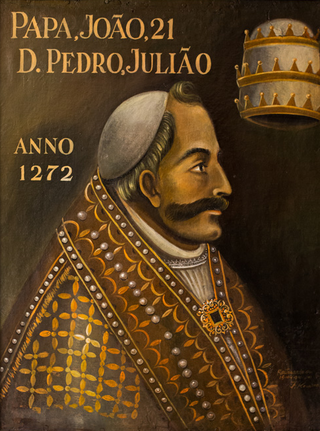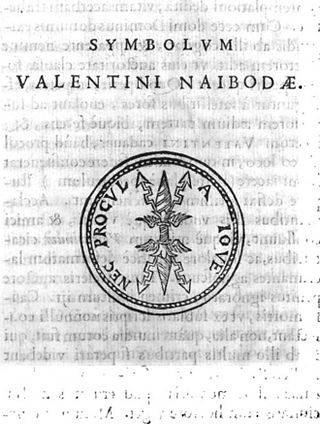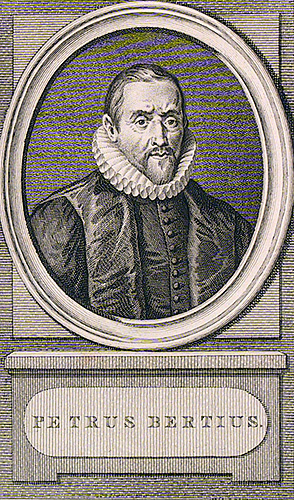
Georgius Agricola was a German Humanist scholar, mineralogist and metallurgist. Born in the small town of Glauchau, in the Electorate of Saxony of the Holy Roman Empire, he was broadly educated, but took a particular interest in the mining and refining of metals. He was the first to drop the Arabic definite article al-, exclusively writing chymia and chymista in describing activity that we today would characterize as chemical or alchemical, giving chemistry its modern name. For his groundbreaking work De Natura Fossilium published in 1546, he is generally referred to as the Father of Mineralogy and the founder of geology as a scientific discipline.

Pope John XXI, born Pedro Julião, was the bishop of Rome and head of the Catholic Church from 8 September 1276 to his death. He is the only Portuguese pope in history. He is sometimes identified with the logician and herbalist Peter of Spain, which would make him the only pope to have been a physician.

Johannes Müller von Königsberg, better known as Regiomontanus, was a mathematician, astrologer and astronomer of the German Renaissance, active in Vienna, Buda and Nuremberg. His contributions were instrumental in the development of Copernican heliocentrism in the decades following his death.

Conrad Celtes was a German Renaissance humanist scholar and poet of the German Renaissance born in Franconia. He led the theatrical performances at the Viennese court and reformed the syllabi.
Pope Damasus II was the Bishop of Rome and ruler of the Papal States from 17 July 1048 to his death on 9 August that same year. He was the second of the German pontiffs nominated by Emperor Henry III. A native of Bavaria, he was the third German to become pope and had one of the shortest papal reigns.

Petrus Apianus, also known as Peter Apian, Peter Bennewitz, and Peter Bienewitz, was a German humanist, known for his works in mathematics, astronomy and cartography. His work on "cosmography", the field that dealt with the earth and its position in the universe, was presented in his most famous publications, Astronomicum Caesareum (1540) and Cosmographicus liber (1524). His books were extremely influential in his time, with the numerous editions in multiple languages being published until 1609. The lunar crater Apianus and asteroid 19139 Apian are named in his honour.

Petrus de Dacia was a 13th-century Swedish friar of the Dominican Order. He was most noted for his correspondence with the mystic and ecstatic Christina von Stommeln. Though he wrote in Latin, Petrus de Dacia is often credited as the first author in Sweden.

Valentin Friedland, also called Valentin Troitschendorf after his birthplace, was a German scholar and educationist of the Reformation. Friedland was a friend of Martin Luther and Melanchthon. His fame as a teacher was an attraction of Goldberg in Silesia, where he taught pupils from far and near. The secret of his success lay in his inculcating on his pupils respect for their own honour. He had a great faith in the intelligence that evinced itself in clear expression.

Arbeoof Freising was an early medieval author and the Bishop of Freising from 764.

Caspar Creuziger, also known as Caspar Cruciger the Elder, was a German Renaissance humanist and Protestant reformer. He was professor of Theology at the University of Wittenberg, preacher at the Castle Church, secretary to and worked with Martin Luther to revise Luther's German Bible translation.
Peter of Auvergne was a French philosopher and theologian.

Peter Paludanus was a French theologian and archbishop.
Richard Croke was an English classical scholar and a royal tutor and agent.
Hieronymus Dungersheim or Dungersheym von Ochsenfart(1465, Ochsenfurt – 1540) was a German Catholic theologian and controversialist (skeptic). A professor of the University of Leipzig, he was an early opponent of the Lutherans there.

Cyprián Karásek Lvovický was a Bohemian astronomer, mathematician and astrologer.

Bruttig-Fankel is an Ortsgemeinde – a municipality belonging to a Verbandsgemeinde, a kind of collective municipality – in the Cochem-Zell district in Rhineland-Palatinate, Germany. It belongs to the Verbandsgemeinde of Cochem, whose seat is in the like-named town.

Valentin Naboth, known by the latinized name Valentinus Nabodus, was a German mathematician, astronomer and astrologer.

Petrus Lotichius Secundus or Peter Lotz was a scholar and a significant Neo-Latin poet of the 16th century.

Petrus Bertius was a Flemish philosopher, theologian, historian, geographer and cartographer. Bertius published much in mathematics, and historical and theological works, but he is now best known as cartographer with his edition of the Geographia of Ptolemy, and for its atlas.















